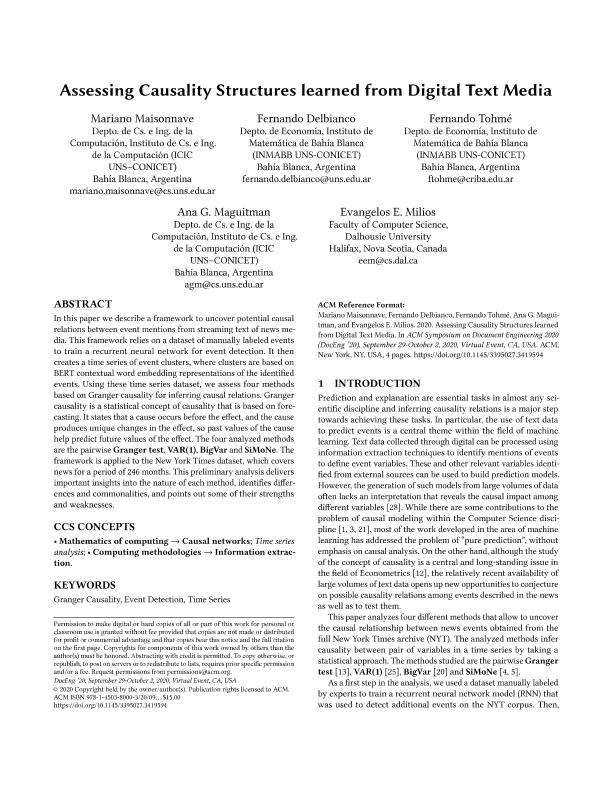Mostrar el registro sencillo del ítem
dc.contributor.author
Maisonnave, Mariano

dc.contributor.author
Delbianco, Fernando Andrés

dc.contributor.author
Tohmé, Fernando Abel
dc.contributor.author
Maguitman, Ana Gabriela
dc.contributor.author
Milios, Evangelos E.
dc.date.available
2021-08-11T13:00:44Z
dc.date.issued
2020
dc.identifier.citation
Assessing Causality Structures learned from Digital Text Media; DocEng '20: ACM Symposium on Document Engineering 2020; New York; Estados Unidos; 2020; 1-4
dc.identifier.isbn
978-1-4503-8000-3
dc.identifier.uri
http://hdl.handle.net/11336/138139
dc.description.abstract
In this paper we describe a framework to uncover potential causal relations between event mentions from streaming text of news media. This framework relies on a dataset of manually labeled events to train a recurrent neural network for event detection. It then creates a time series of event clusters, where clusters are based on BERT contextual word embedding representations of the identified events. Using these time series dataset, we assess four methods based on Granger causality for inferring causal relations. Granger causality is a statistical concept of causality that is based on forecasting. It states that a cause occurs before the effect, and the cause produces unique changes in the effect, so past values of the cause help predict future values of the effect. The four analyzed methods are the pairwise Granger test, VAR(1), BigVar and SiMoNe. The framework is applied to the New York Times dataset, which covers news for a period of 246 months. This preliminary analysis delivers important insights into the nature of each method, identifies differences and commonalities, and points out some of their strengths and weaknesses.
dc.format
application/pdf
dc.language.iso
eng
dc.publisher
Association for Computing Machinery
dc.rights
info:eu-repo/semantics/openAccess
dc.rights.uri
https://creativecommons.org/licenses/by-nc-sa/2.5/ar/
dc.subject
GRANGER CAUSALITY
dc.subject
EVENT DETECTION
dc.subject
TIMES SERIES
dc.subject.classification
Ciencias de la Computación

dc.subject.classification
Ciencias de la Computación e Información

dc.subject.classification
CIENCIAS NATURALES Y EXACTAS

dc.title
Assessing Causality Structures learned from Digital Text Media
dc.type
info:eu-repo/semantics/publishedVersion
dc.type
info:eu-repo/semantics/conferenceObject
dc.type
info:ar-repo/semantics/documento de conferencia
dc.date.updated
2021-06-22T13:49:30Z
dc.journal.pagination
1-4
dc.journal.pais
Estados Unidos

dc.journal.ciudad
New York
dc.description.fil
Fil: Maisonnave, Mariano. Consejo Nacional de Investigaciones Científicas y Técnicas. Centro Científico Tecnológico Conicet - Bahía Blanca. Instituto de Ciencias e Ingeniería de la Computación. Universidad Nacional del Sur. Departamento de Ciencias e Ingeniería de la Computación. Instituto de Ciencias e Ingeniería de la Computación; Argentina
dc.description.fil
Fil: Delbianco, Fernando Andrés. Consejo Nacional de Investigaciones Científicas y Técnicas. Centro Científico Tecnológico Conicet - Bahía Blanca. Instituto de Matemática Bahía Blanca. Universidad Nacional del Sur. Departamento de Matemática. Instituto de Matemática Bahía Blanca; Argentina. Universidad Nacional del Sur. Departamento de Economía; Argentina
dc.description.fil
Fil: Tohmé, Fernando Abel. Consejo Nacional de Investigaciones Científicas y Técnicas. Centro Científico Tecnológico Conicet - Bahía Blanca. Instituto de Matemática Bahía Blanca. Universidad Nacional del Sur. Departamento de Matemática. Instituto de Matemática Bahía Blanca; Argentina. Universidad Nacional del Sur. Departamento de Economía; Argentina
dc.description.fil
Fil: Maguitman, Ana Gabriela. Consejo Nacional de Investigaciones Científicas y Técnicas. Centro Científico Tecnológico Conicet - Bahía Blanca. Instituto de Ciencias e Ingeniería de la Computación. Universidad Nacional del Sur. Departamento de Ciencias e Ingeniería de la Computación. Instituto de Ciencias e Ingeniería de la Computación; Argentina
dc.description.fil
Fil: Milios, Evangelos E.. Dalhousie University. Faculty of Computer Science; Canadá
dc.relation.alternativeid
info:eu-repo/semantics/altIdentifier/url/https://dl.acm.org/doi/10.1145/3395027.3419594
dc.relation.alternativeid
info:eu-repo/semantics/altIdentifier/doi/http://dx.doi.org/10.1145/3395027.3419594
dc.conicet.rol
Autor

dc.conicet.rol
Autor

dc.conicet.rol
Autor

dc.conicet.rol
Autor

dc.conicet.rol
Autor

dc.conicet.nroedicion
2020
dc.coverage
Internacional
dc.type.subtype
Simposio
dc.description.nombreEvento
DocEng '20: ACM Symposium on Document Engineering 2020
dc.date.evento
2020-09-29
dc.description.ciudadEvento
New York
dc.description.paisEvento
Estados Unidos

dc.type.publicacion
Book
dc.description.institucionOrganizadora
Association for Computing Machinery
dc.source.libro
DocEng '20: Proceedings of the ACM Symposium on Document Engineering
dc.date.eventoHasta
2020-10-01
dc.type
Simposio
Archivos asociados
